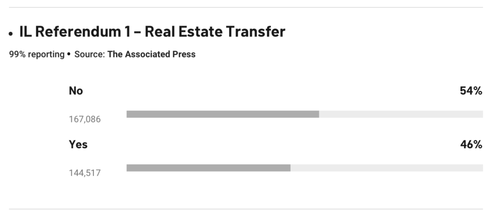Voter Apathy And Four Key Takeaways From Illinois’ 2024 Primary Elections
By Ted Dabrowski and John Klingner of Wirepoints
Don’t get too excited about the results of Tuesday’s primary elections, particularly in Chicago. The results don’t represent either a mandate for, or a categorical rejection of, anyone or anything. They can’t when just 20.2% of Chicago voters cast a ballot on Tuesday, a likely new low according to the Chicago Board of Elections.
What the results do represent is a growing voter apathy. On both sides.
This election should have been a dominating one for the Chicago Teachers Union and its defacto leader, Mayor Brandon Johnson. Union members could have helped produce a new $100 million tax to benefit their allies and themselves. They could have put in power an establishment state’s attorney picked to perpetuate the criminal and social justice agenda led by current office holder Kim Foxx. Instead, the union vote didn’t materialize. For CTU’s leadership, this election should be considered a disaster.
On the other side of the voting ledger, crime has dominated the news, and so has the illegal immigration crisis. Few in Chicago are happy with the progressive leadership under Mayor Johnson. Protest votes should have been out in full force. The numbers should have been big. Instead, most people stayed at home.
Yes, the opposition, if you can call it that, may squeak out wins in opposing a real estate tax hike and the next “anointed” state’s attorney – assuming results hold over the next few days – but be careful what you make of it, regardless of how it all finally shakes out. The main message may be that the unions weren’t motivated to come out and organize the votes. There probably wasn’t enough money at stake for them. What’s a $100 million? And they simply couldn’t tell the difference between the two Cook County State’s Attorney candidates in the primary race. So they stayed away from the polls.
Elsewhere in the state, voter apathy was also in full display. Many outlets reported “shockingly” low voter turnout, from Decatur to Mattoon to Rockford (just 12%!). Regardless, the few people who did vote decided several important races.
Here are four takeaways we observed:
1. Mayor Johnson loses big either way
The real estate transfer tax hike, an initiative spearheaded by Mayor Johnson, likely failed to pass with nearly 54% of voting Chicagoans voting no. (There is still a significant number of mail-in votes to count, but expectations are that the referendum will fail. Nevertheless, it’s hasn’t been called yet.)
The referendum’s failure will be a blow to Johnson whether the referendum wins or loses. He wasn’t able to motivate Chicagoans to come out. Sure there was fanfare, with the CTU marching CPS students to the polls. Johnson even structured the tax to provide small relief to the overwhelming majority of Chicagoans – only hitting the city’s wealthiest homeowners and businesses. It was the perfect soak-the-rich campaign that should have won easily.
Pass or fail, Johnson lost.
2. Cook County President Toni Preckwinkle is another big loser.
As of this writing, the race between Eileen O’Neill Burke and Clayton Harris III for the Democratic candidacy for Cook County State’s Attorney is too close to call, but Burke has a slim lead.
Whoever wins won’t make much difference to Chicagoans, as neither is likely to dramatically change direction from Kim Foxx’s tenure.
The results are bad news for Toni Preckwinkle, as she backed Harris. Even if he somehow ekes out a win over Burke, the fact that the race was so close – and so few people voted – shows Preckwinkle’s influence over Cook County isn’t as ironclad as she thinks it is.
3. Members of Illinois’ Freedom Caucus survive attempts to take them out.
Members of the downstate Republican Freedom Caucus, Reps. Adam Niemerg, Blaine Wilhour and Brad Halbrook, all survived primary challenges this Tuesday.
The victories of Wilhour and Niemerg are particularly notable as they both faced teachers-union backed opponents. Wilhour won with a resounding 79% of the vote and Niemerg won an even bigger 88%.
And that’s after the unions spent several hundreds of thousands backing their candidates.
4. Mixed results on school district tax and bond referendums.
Results for school district bond and tax referendums were typical, with a mix of propositions passing and failing.
Notable referendum failures include Avoca SD 37’s (Wilmette) bond referendum, the details of which we covered here, with over 75% of voters saying no. Central SD 301’s ask for $195 million in bonds also failed, with more than 63% of voters casting a no vote.
Both those referendums faced a tough opposition of concerned residents, which goes to show that taxpayers can successfully band together and prevent wasteful spending if they organize.
In contrast, Glenbard Township High School District 87 managed to get its $183 million project approved – albeit just barely. The referendum passed 50.2% to 49.8% with a difference of just 89 votes.
As we covered earlier this month, the district’s pro-referendum machine spent more than $50,000 to get the proposal over the finish line while facing no major, formal opposition. The result would very likely have been different if residents had been able to officially organize.
*******
A final takeaway. Maybe, just maybe, the low voter turnout points to a real opportunity for those in the opposition – for those wanting to turn Illinois around. It takes fewer and fewer votes to win something these days.
The question is, does any real, principled, large-scale opposition exist anymore? And can it make its case, convincingly, to get out the vote?
For now, I think we know the answer.
Tyler Durden
Thu, 03/21/2024 – 19:00
via ZeroHedge News https://ift.tt/Ku3PHA2 Tyler Durden
